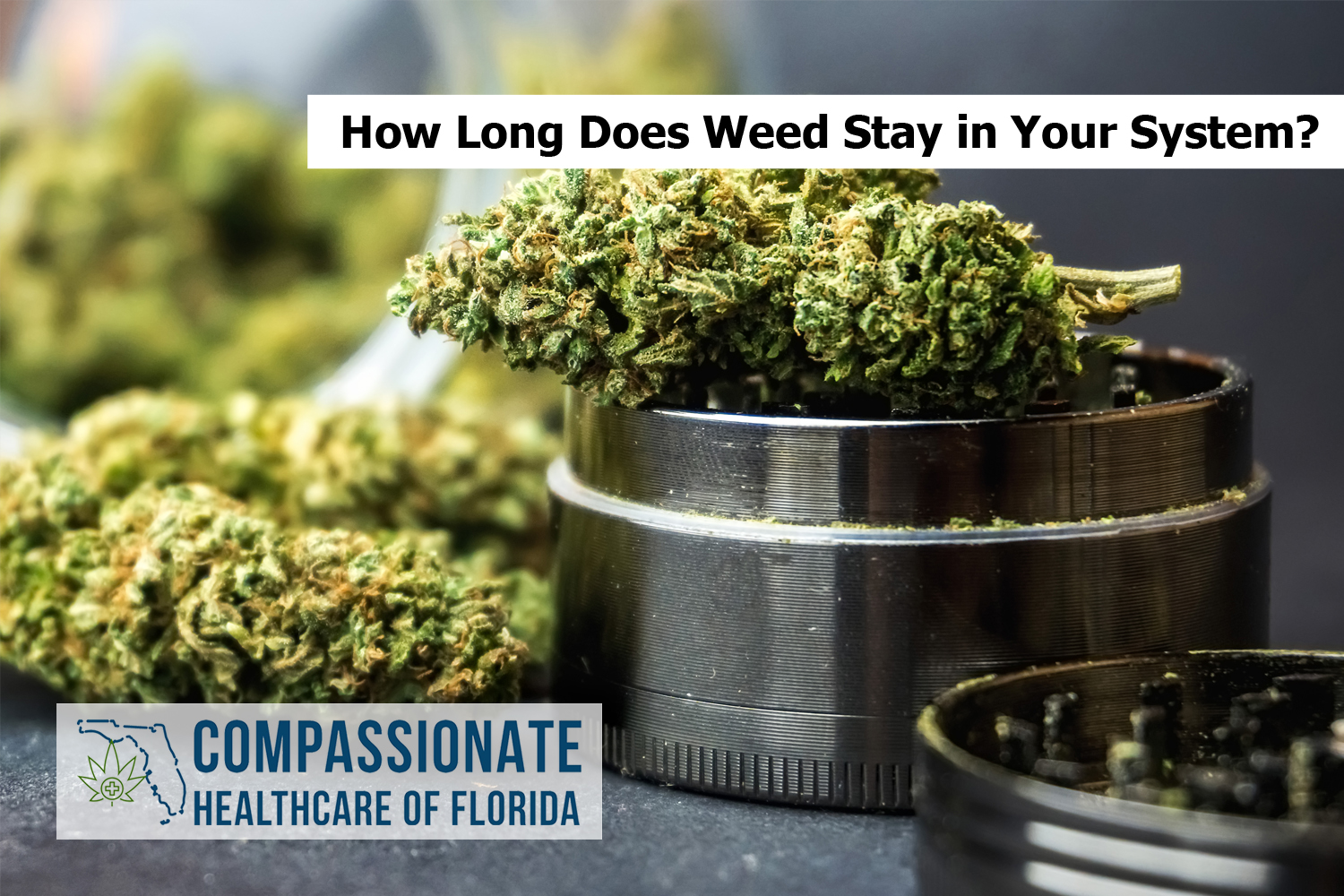
You may be wondering how long weed stays in your system. The truth is that it will depend on several factors, including the type of marijuana and what other drugs you take. In this article, we will go over the different factors that contribute to how long cannabis stays in your system and what you can do to speed up the process of detoxing!
Smoking weed is just one of many cannabis products that are legal for patients in Florida who have qualified cards. But, regular users might be wondering how long the effects of smoking will linger and if it can show up on a drug test at some point down the line? We’ve got your back! Here’s everything you need to know about how much time weeds stay active before leaving your system.
If you’re worried about whether or not being high has left its mark on any future tests, we’ll break things down so there won’t be anything confusing, come what may. Some people who smoke or vape weed may only feel its effects for a few hours. After that, they will likely be as alert and sober as before the high wore off. THC can remain in your system after smoking or vaping marijuana and show up on certain drug tests days to weeks later, depending on circumstances.
In a world where marijuana is still technically illegal, it’s no surprise that drug tests will be an issue for some users. But if you’re on the right side of legality (i.e., using medical cannabis), then all should work out well enough. Nonetheless, knowing what to expect in terms of marijuana lingering in your system is helpful. Some legal cannabis consumers may desire to cleanse their system from time to time, and there are several options.
Weed is a tricky thing. If you want to know how long it’ll stay in your system, then we’ve got the answer for you! We’re going to detail what weed does and doesn’t do when consumed by someone’s body so that everyone can have an educated opinion on pot consumption. After all, this is something worth learning about before making any decisions.
How long do weed’s effects last?
Some people like to know how long they can experience the effects of marijuana. The answer is that it depends on various factors, including what kind of weed you use, your metabolism, and the amount ingested. Some could feel the affect as short as in 20 minutes, while others may not feel high for at least 60-90 minutes after smoking or consuming edibles. The effect or high from cannabis can last for minutes for inhalation too many hours for consumable methods like edibles. Keep reading below to find out more about this question!
The marijuana high is a fleeting feeling that most people have. The process of getting high usually feels like you’re floating on air, excited and very happy with the world around you; not surprisingly, this effect doesn’t last forever. They can wear off after just a few hours, depending on factors such as weed potency or how often one smokes. But generally, they only last for about an hour to two hours maximum before your body returns to its normal state.
The chemical THC in cannabis makes one high by binding with receptors all over our brain—including some found near eye nerves, which will heighten someone’s sense of sight; nerve endings around hair follicles and sweat glands, which increases feelings of pleasure when touched; sites where chemicals are synthesized into neurotransmitters, which will heighten someone’s mood and sense of well-being; even receptors in the brain stem that regulate blood pressure, breathing rate and heart muscle tone. But it also binds with cannabinoid receptors found all over our body—especially abundant in those parts of your gastrointestinal tract involved in appetite regulation and how one feels after a meal (i.e., stomach), as well as those sites where fat is stored and metabolized.
While THC can make an individual feel euphoric, giddy, or relaxed, CBD has no psychoactive effects whatsoever on its own but may modulate some of the adverse effects caused by smoking weed like paranoia or anxiety associated with excessive THC intake. And while you might not get high off hemp plants grown for fiber instead of their leaves and buds, you definitely can still feel the effects of it. In conclusion, getting high is an experience that takes a bit to figure out for oneself.
How long does marijuana stay in your body?
Many factors can affect the length of time weed stays in your body. Let’s break down the various ways marijuana affects you and just how long these effects last. Generally speaking, when all tests are combined, marijuana stays in your body anywhere between two weeks and four months after stopping usage. The length of time varies depending on the frequency of consumption, but it generally lasts about a month at most before being flushed out from one’s system. The THC content of marijuana determines how quickly you can process and eliminate it from your system.
The first thing that needs to be said is that not everyone has detectable levels of cannabis metabolites circulating through their bloodstream; this comes down to genetics as well as other factors like smoking techniques, rate of metabolism, and muscle mass. It also depends on weight, height, age, frequency or duration of use, diet, and lifestyle habits.
– Cannabis can stay in your system for up to 30 days.
– In some cases, depending on the frequency of use and other factors, it can be detected for about 60 days after last consumption or exposure.
– Marijuana is detectable by a drug test at least one day following the date you consumed cannabis.
– The frequency of use, the potency and amount of cannabis consumed, food intake before taking a drug test can all affect how long marijuana stays in your system.
– Low doses will typically be detectable for three to four days after last consumption, while high doses could stay up to eight or more days.
– THC (the main active ingredient) can remain detectable for up to four months after heavy usage, while other components like CBD may not be detected at all, even when they are present in the bloodstream.
A person who smokes weed every day would likely see their THC levels rise slowly over time until they reach what’s called “peak level.” People who use cannabis heavily may not be able to stay at the peak level for very long, but they’ll still have THC in their system from recent days of smoking. However, heavy users will also experience getting their body used to having weed around and stop releasing as much dopamine in response when they smoke it. The best way to combat this phenomenon is by taking a break from using cannabis altogether – about four weeks or so should do the trick!
How long does it take for cannabis to be detected in a drug test?
Weed is a substance that can be detected in your system long after its effects have worn off. That’s why drug tests are essential to take when applying for new jobs or going through probation with the law. We will give an overview of the different tests that are used for detecting its presence. The various types of drug testing can be broken down into four categories: blood, urine, saliva, and hair follicle test.
Urine Tests – Urine is a liquid waste product excreted by the kidneys during urination and contains substances too small to see without a microscope. It’s often collected as part of routine physical exams or medical check-ups when someone is suspected of using drugs because it offers one way to detect evidence that they have been taking them. For new users, the matabolites level of detection can fall below a positive result in 48-72 hours; however, chronic users can show up positive on a screening test for over 60 days.
Hair Follicle Tests – One of the most common ways for employers to test their employees and other professionals is by checking hair strands from around their scalp. They use a device called an Elisa immunoassay that detects THC, an active ingredient in marijuana, in follicles along with melanin (the pigment responsible for skin tone) which serves as a contrast agent to differentiate between drug-free hair and those containing drugs. When it comes to these tests, there are two methods: one-time testing or periodic testing, where samples are taken at random intervals over time. The first option has been found to be less cost-effective than regular testing due to higher detection rates achieved through this method.
Saliva testing – Employers can also check oral fluids for THC with a saliva test. This is the most common type of drug testing done by employers, and it only takes about 24 hours or 72 hours to get results from this method. Some newer market screening tests can give a result in minutes. A saliva drug screen (or oral swab) could show if someone has consumed cannabis within the last few days. However, some people say they may never have any trace amounts detected at all!
Blood testing – An individual can test positive for the presence of THC with a blood sample as well. However, this method is more complicated and typically takes longer to process. THC metabolites are detectable in blood up to 24 hours after consumption usually, although it varies depending on an individual’s metabolism. The window fluctuates from person to person, so there’s no clear answer when lab workers will be able to detect weed usage via a simple blood test alone.
Are drug tests a concern for medical marijuana users?
You can consume cannabis lawfully for your needs if you go through the procedure of receiving a medical marijuana card or prescription in your state. It is important to note that drug tests are still administered, and tested positive could result in harsh consequences on future opportunities.
Medical marijuana is legal, but even so, many states allow workplaces to enforce a drug-free workplace. This policy might result in you losing your job if they find out that you’re using it legally and pass the test – this seems unfair treatment for people who need medicinal cannabis!
Even though several US states have legalized medical marijuana, some still maintain their stance on preventing employees from doing drugs while at work. If an employee passes a urine or saliva sample (depending on where they work) with traces of THC in them, they could lose their jobs depending on what state law says about these things; workers should be aware of how strict employers’ policies are before medicated off-duty.
Medical marijuana is not illegal in all states, but it can still be a problem for you at work. Please find out more about the laws where you live and your workplace’s policies before taking any action or disclosing anything to them.
How to get cannabis out of your system as quickly as possible
Medical marijuana is legal in several states and can be prescribed by a qualified physician. This means that some people use cannabis to manage their symptoms. Unfortunately, it stays in your body long after the effects wear off-and when you’re trying to get clean for work or school; this can present problems. We’ve put together a list of tips on how to flush weed out as quickly as possible!
Increase intake of fiber foods – these help move things through your system more quickly than any other food type. You can also take a fiber supplement that contains psyllium husk or oat bran; These types of supplements are easy on the stomach, so you won’t experience uncomfortable side effects such as nausea, bloating, and gas while also helping manage constipation problems. Psyllium Husks increase stool bulk by drawing water into the colon, where they swell up like little sponges making waste easier for your digestive tract to expel.
Eat healthy foods rich in vitamins A & C. These are essential nutrients as they support liver function, which plays a vital role in processing marijuana out of the body naturally over time. Eating fresh produce will also increase fiber intake from fruits and vegetables, which can help stimulate bowel movements.
Drink lots of water – this helps hydrate the cells, so they can better do their job effectively. This will also flush out toxins and other impurities from your body. A healthy, well-hydrated person is more likely to have faster metabolism rates.
Exercise regularly (even if just simple walking will suffice) – exercise encourages blood flow which helps flush toxins.
Drink coffee – caffeine can help stimulate bowel movements and get things moving through your intestines more quickly. This is especially helpful if you struggle with constipation, eating junk food, or lack a high-quality diet.
Get plenty of sleep – lack of sleep has been linked to slower metabolism rates which in turn means that everything takes longer for your body to process and eliminate waste products like THC. Aim for at least eight hours every night.
Use Medical Marijuana Legally With Compassionate Healthcare of Florida
Please schedule an appointment with one of our preeminent medical marijuana doctors. Our physicians will provide a recommendation for your condition and recommend the best treatment options. If you have any questions about medical cannabis, contact us at (833) 633-3665.



